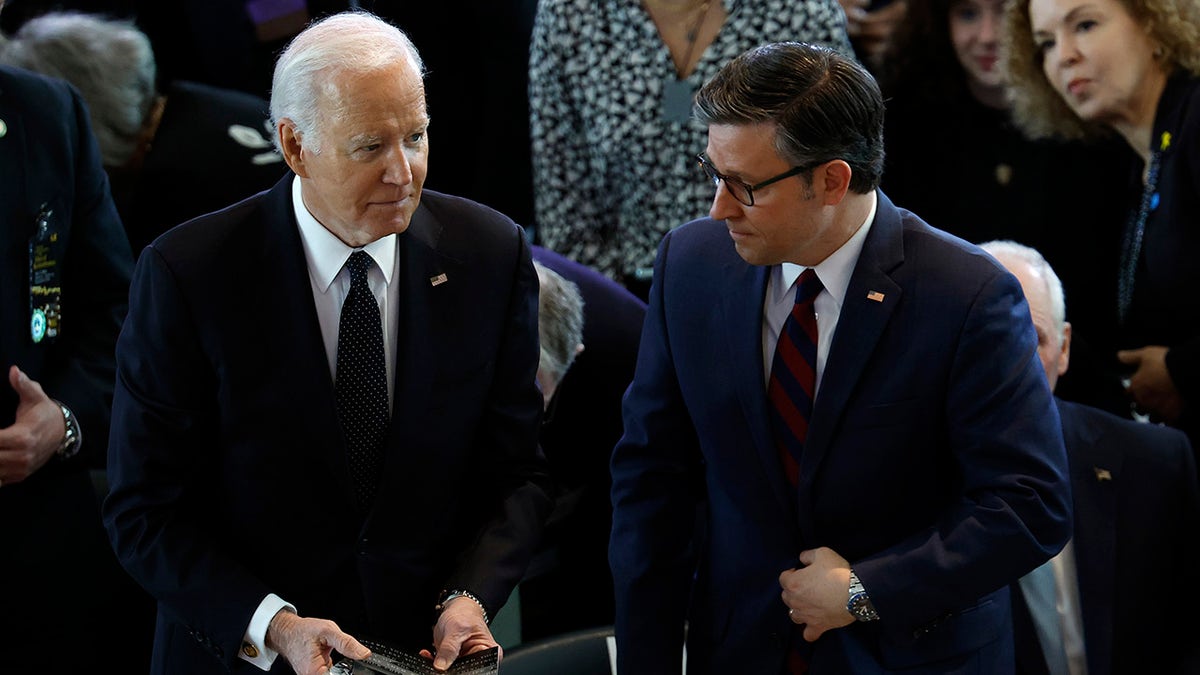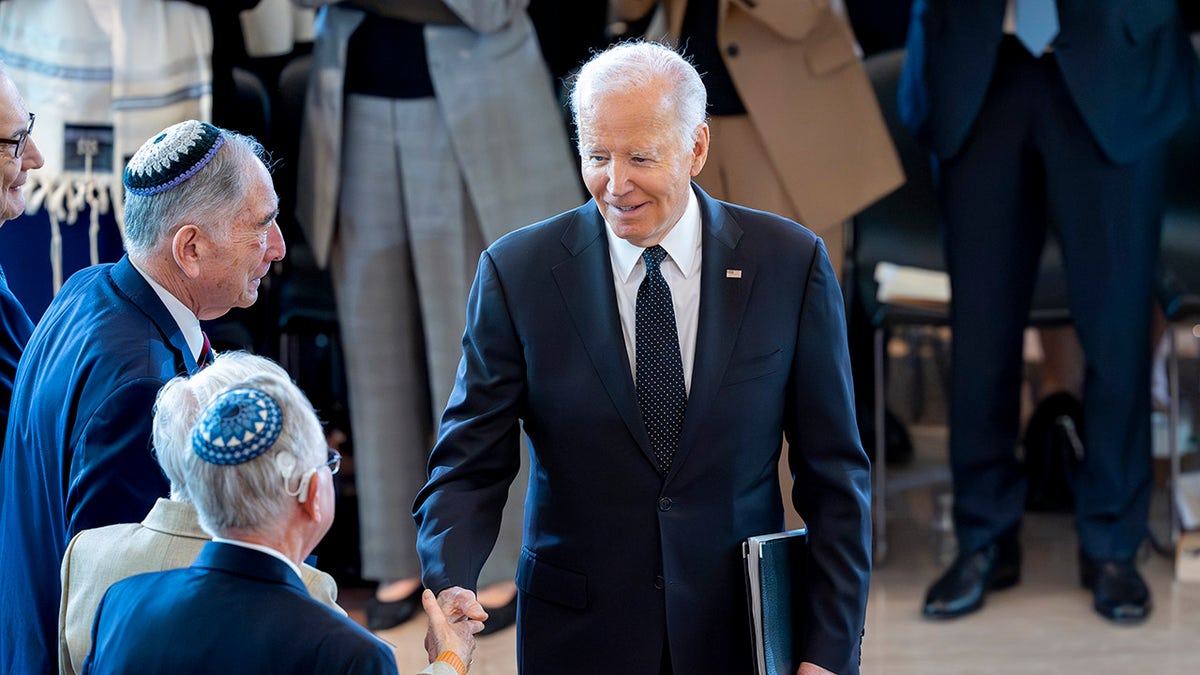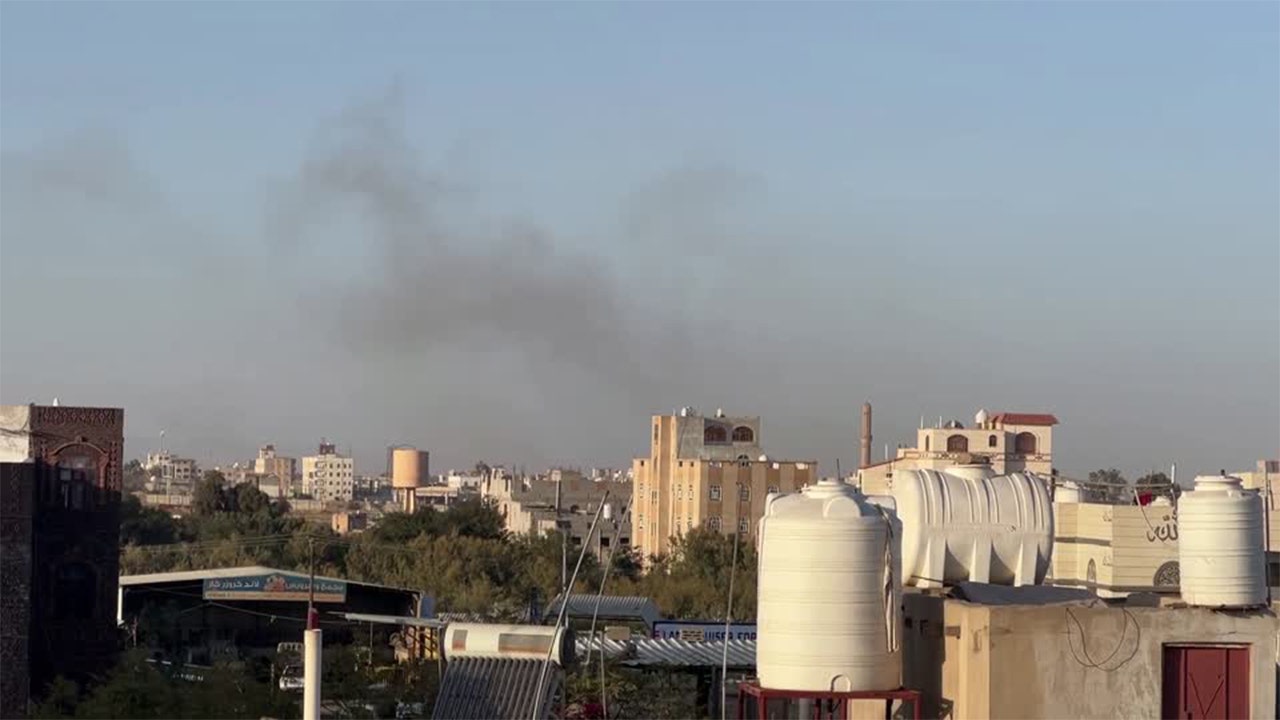The White House National Security Council reportedly sought to keep the decision to stop supplying U.S. weapons that Israel could use to launch an all-out assault on Rafah out of the public eye for several days until after President Biden delivered a public address for Holocaust Remembrance Day.
Biden signed off on the pause in an order conveyed last week to the Pentagon, The Associated Press reported, citing U.S. officials who were not authorized to comment on the matter. But the NSC wanted to keep the decision quiet until after it had a better understanding of the scope of Israel’s intensified military operations in Rafah and Biden delivered a long-planned speech on Tuesday to mark Holocaust Remembrance Day. The shipment was supposed to consist of 1,800 2,000-pound bombs and 1,700 500-pound bombs, a senior U.S. administration official told the AP on the condition of anonymity to discuss the sensitive matter.
The focus of U.S. concern was the larger explosives and how they could be used in a dense urban area.
In an interview with CNN on Wednesday, Biden said he would halt some shipments of U.S. weapons to Israel if Prime Minister Benjamin Netanyahu ordered a major invasion of the city of Rafah, the last major Hamas stronghold in the Gaza Strip. It was the first time Biden said he was prepared to condition American weaponry on Israel’s action in the seven-month-long war launched in response to the Oct. 7 terrorist attacks.
“Civilians have been killed in Gaza as a consequence of those bombs and other ways in which they go after population centers,” Biden told CNN’s Erin Burnett. “I made it clear that if they go into Rafah – they haven’t gone in Rafah yet – if they go into Rafah, I’m not supplying the weapons that have been used historically to deal with Rafah, to deal with the cities – that deal with that problem.”
Biden’s administration in April began reviewing future transfers of military assistance as Netanyahu’s government appeared to move closer toward an invasion of Rafah, despite months of opposition from the White House. An official told the AP the decision to pause the shipment was made last week and no final decision had been made yet on whether to proceed with the shipment at a later date.
BIDEN VOWS TO WITHHOLD WEAPONS FROM ISRAEL IF NETANYAHU GOES FORWARD WITH RAFAH INVASION
Fox News Digital reached out to the White House on Thursday about the AP report but did not immediately hear back.
President Biden speaks at the U.S. Holocaust Memorial Museum’s Annual Days of Remembrance ceremony at the U.S. Capitol, Tuesday, May 7, 2024. (AP Photo/Evan Vucci)
U.S. officials had declined for days to comment on the halted transfer, word of which came as Biden on Tuesday described U.S. support for Israel as “ironclad, even when we disagree.”
Israel’s ambassador to the United Nations, Gilad Erdan, in an interview with Israeli Channel 12 TV news, said the decision to pause the shipment was “a very disappointing decision, even frustrating.” He suggested the move stemmed from political pressure on Biden from Congress, the U.S. campus protests and the upcoming election.
The decision also drew a sharp rebuke from House Speaker Mike Johnson, R-La., and Senate Minority Leader Mitch McConnell, R-Ky., who said they only learned about the military aid holdup from press reports, despite assurances from the Biden administration that no such pauses were in the works. The Republicans called on Biden in a letter to swiftly end the blockage, saying it “risks emboldening Israel’s enemies,” and to brief lawmakers on the nature of the policy reviews.
Biden has faced pressure from some on the left – and condemnation from the critics on the right who say Biden has moderated his support for an essential Mideast ally.
Defense Secretary Lloyd Austin earlier Wednesday confirmed the weapons delay, telling the Senate Appropriations Subcommittee on Defense that the U.S. paused “one shipment of high payload munitions.”
“We’re going to continue to do what’s necessary to ensure that Israel has the means to defend itself,” Austin said. “But that said, we are currently reviewing some near-term security assistance shipments in the context of unfolding events in Rafah.”

President Biden talks to House Speaker Mike Johnson during the Holocaust remembrance ceremony at the U.S. Capitol on May 7, 2024. (Kevin Dietsch/Getty Images)
“If we stop weapons necessary to destroy the enemies of the state of Israel at a time of great peril, we will pay a price,” Sen. Lindsey Graham, R-S.C., said, raising his voice with Austin. “This is obscene. It is absurd. Give Israel what they need to fight the war they can’t afford to lose.”
Independent Sen. Bernie Sanders of Vermont, a Biden ally, said in a statement the pause on big bombs must be a “first step.”
BIDEN WARNS NETANYAHU AGAINST RAFAH INVASION AS ISRAEL PREPARES FOR ACTION
“Our leverage is clear,” Sanders said. “Over the years, the United States has provided tens of billions of dollars in military aid to Israel. We can no longer be complicit in Netanyahu’s horrific war against the Palestinian people.”
Austin, meanwhile, told lawmakers that “it’s about having the right kinds of weapons for the task at hand.”
“A small diameter bomb, which is a precision weapon, that’s very useful in a dense, built-up environment,” he said, “but maybe not so much a 2,000-pound bomb that could create a lot of collateral damage.” He said the U.S. wants to see Israel do “more precise” operations.
Israeli troops on Tuesday seized control of Gaza’s vital Rafah border crossing in what the White House described as a limited operation that stopped short of the full-on Israeli invasion of the city that Biden has repeatedly warned against, most recently in a Monday call with Netanyahu.

President Biden is welcomed as he arrives to honor the memory of the 6 million Jews killed in the Holocaust, at the Capitol, Tuesday, May 7, 2024. (AP Photo/J. Scott Applewhite)
Israel has ordered the evacuation of 100,000 Palestinians from the city. Israeli forces have also carried out what it describes as “targeted strikes” on the eastern part of Rafah.
Privately, concern has mounted inside the White House about what’s unfolding in Rafah, according to the AP, but publicly administration officials have stressed that they did not think the operations had defied Biden’s warnings against a widescale operation in the city. The State Department is separately considering whether to approve the continued transfer of Joint Direct Attack Munition kits, which place precision guidance systems onto bombs, to Israel, but the review didn’t pertain to imminent shipments.
Itamar Yaar, former deputy head of Israel’s National Security Council and CEO of Commanders for Israel’s Security, a group of former senior Israeli security officials, said the U.S. move is largely symbolic, but a sign of trouble and could become more of a problem if it is sustained.
“It’s not some kind of American embargo on American munitions support, but I think it’s some kind of diplomatic message to Mr. Netanyahu that he needs to take into consideration American interests more than he has over the last few months,” he said, adding it’s “a kind of a signal, a ‘be careful.’”
CLICK HERE TO GET THE FOX NEWS APP
The U.S. dropped the 2,000-pound bomb sparingly in its long war against the Islamic State terrorist group. Israel, by contrast, has used the bomb frequently in the seven-month Gaza war. Experts told the AP the use of the weapon, in part, has helped drive the Palestinian casualty count that the Hamas-run health ministry puts at more than 34,000 dead, though it does not distinguish between combatants and civilians.
The Associated Press contributed to this report.





